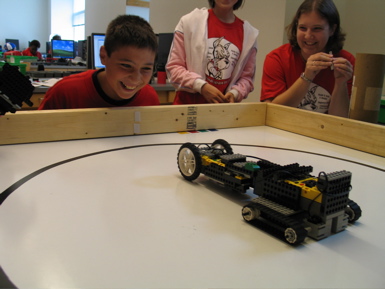Summer Design Camp nurtures the child’s inner engineer

Engineering, like all professions, requires a steady influx of new talent to maintain the field’s vitality. But a relative dearth of young Americans studying math and science is restricting the flow of homegrown engineers. The perception among K-12 students that science and engineering are impossibly difficult, say observers, isn’t helping.
Enter the College of Engineering Design Camp, which for the fourth consecutive summer this year, hosted scores of enthusiastic middle- and junior high-school students, teaching them the engineering basics and showing them the joys of building things and solving problems. This year’s camp drew a total of 60 students to two week-long sessions in July. The classes were taught by high school teachers trained by ENG staff.
“The program teaches them the relevant engineering principles, gives them a box of parts and lets them build something,” says ENG Assistant Dean for Administration Richard Lally, who organized the camp. “They create imaginative machines, learn what it’s like to be an engineer and have lots of fun.”
The younger students built motorized gadgets and constructed candy safes with electromagnetic locks and alarms in the camp’s Electrical and Mechanical Gizmos section. Intently laboring next to a board bearing the inscription “Engineering is Problem Solving,” the boys and girls focused on their soldering irons, switches, wires and other materials as they built electromagnetic gadgets of their own design.
The Robo-Alley section had more advanced students, who used special Lego kits to create robotic vehicles with electric motors and small computers, which they programmed to make the vehicles perform specific maneuvers. At the end of each day, the vehicles squared off in a series of contests that tested the maneuverability, speed and durability of the students’ creations.
Each day also included a visit to the lab of BU engineering professor, where they were exposed to some more advanced engineering concepts and experienced what life is like on the campus of a major research university.
“The advantage of this program is that it targets the younger kids who might start to drift away from math and science in the middle grades,” says Paul LePlume, a high school math teacher who ran the camp’s Electrical and Mechanical Gizmos section. “You can sort of capture them back. You can get them interested in science when they’re starting to make those internal decisions about what they like and don’t like.”
For some students, the camp is fueling an already intense interest in engineering, an appetite that is not being sated in traditional classrooms. Seventh-grader Amirah Mitchell, a veteran of several science camps, said the BU Design Camp is different because it stresses experimentation over regimentation. “A lot of science camps I’ve been to had a strict curriculum that we always had to follow," she says. "They had the experiments all laid out for you instead of letting you figure it out for yourself."
Students and teachers enjoy the confidence that students gain in solving problems on their own.
“First, you try it, and it crashes and collapses,” says Nathaly Nicolls Figueroa Quenguan, a ninth-grader, of the robotic vehicle building and testing process. “And maybe the second time, too. But eventually, it actually works and you feel really proud of yourself.
"You think there’s a lot to building robots, and there is,” she adds. “But it’s not impossible; you can actually do it. So, in the future, if I want to do something, I know I can.”